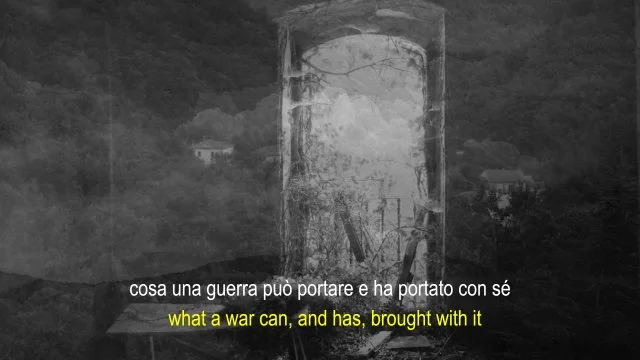Single channel projection, 8:20. Original audio recordings. Italian. Italian and English subtitles.
under the foot of neptune
Under the Foot of Neptune is an exploration of the omnipresent threat of nuclear warfare and its entwinement with humanity’s environmental and ethical crises. Through visuals, soundscapes, and narrative, the video work reflects on the destructive potential of nuclear weapons and a precarious coexistence of power and renewal, situating the destructive potential of nuclear weapons within mythological, historical and ecological contexts.
The film opens with imagery of the feet of Neptune, the Roman sea god, poised at the base of the Fountain of Neptune, Florence. Surrounding Neptune at his feet as wild horses that surge forward, their forms caught in a moment of movement. The initial focus on Neptune’s feet and horses is an engagement with stability and movement that echoes the nature of nuclear power being a tool of unprecedented power and an instrument of ultimate destruction. The foundation embodies the god’s dominion over oceans and storms, contrasting with humanity’s attempts to wield comparable power through nuclear armament. The wild horses prefigure the film’s exploration of systems where power and renewal coexist in an uneasy state.
The narrative shifts to the commune of Filignano, Molise, a landscape shaped by the aftermath of war and the slow reclamation of nature (captured at the time in black and white by photojournalist Robert Capa).
The region, impacted by the Allied campaigns of 1944, now bears the marks of abandonment, with forests reclaiming Roman and Samnite paths, and smaller villages that assert the enduring power of ecological processes that surpass the destruction of human actions.
The contemporary specter of nuclear warfare enters through a speech delivered by the Mayor of Rome, Roberto Gualtieri, in front of the Pantheon, itself an enduring system of permanence possible through Roman concrete technological innovations. On the anniversary of the bombing of Hiroshima, Gualtieri speaks of the political rhetoric of war within the context of Vladimir Putin’s 2022 threats of nuclear strikes against Ukraine that bring attention to the ethical and existential threats posed by nuclear armament. Through the window of a long-abandoned home, a light emerges, the glimmer of an ornate orb that shifts as a storm breaks, dissolving into the entrance of a Samnite shepherds hut, deep in the mountains of Molise.
Amongst the backdrop of myth, history, and contemporary geopolitics, the threat of nuclear warfare is a part of a continuum of power that questions not only the future of human survival, but also the systems of logic and domination that have brought us to this precarious edge where human presence has become a type of divine intervention.



